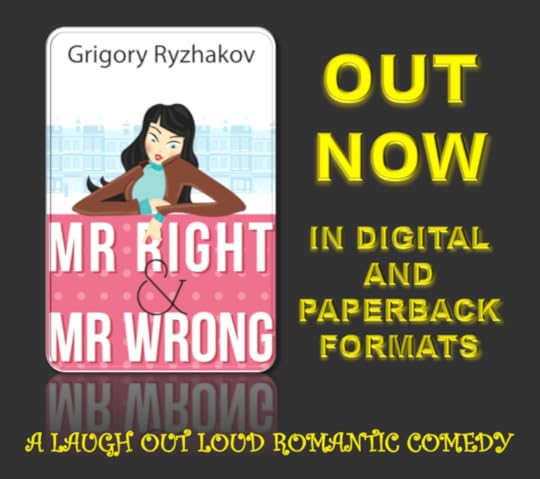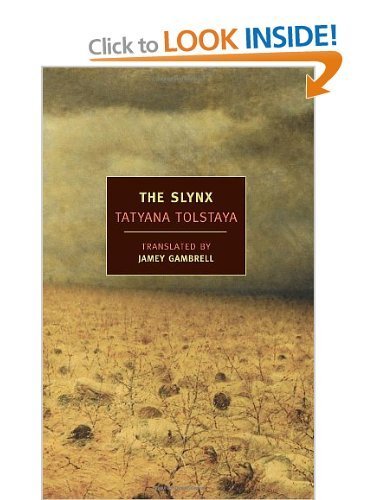Grigory Ryzhakov's Blog, page 6
November 27, 2013
Moviember: Catching Fire or a Cold?
November 2013 is a rather atypical month as multiple Oscar contenders, normally appearing on the screen in January/February, have already been released in the UK. Also massive blockbusters made November as big as summer months in the box office.
Your humble Russian sampled the latest Hollywood cuisine and here is my verdict.
PHILOMENA
http://www.youtube.com/watch?v=4DBPqcp6Hc4
Philomena topped my list of November flicks, with the director Stephen Frears and the leading actress Judi Dench well worth Oscar nominations. Philomena is a story of an old woman, a retired nurse, who is looking for her son that was taken from her for adoption while she worked at a nunnery in Ireland when she was young. She waited for fifty years to tell this story to someone. This someone else turned out to be a sacked BBC correspondent Martin Sixsmith, played here by a British comedian Steve Coogan.
Sixsmith first reluctantly then with growing enthusiasm takes the job to work on Philomena’s story, which unravels to be both fascinating and horrifying and featuring high American politics, same sex relationship and yet another nail into coffin of the Catholic Church reputation as an institution that, when uncovered, makes Sixsmith doubt if he should publish his investigation at all.
It’s astonishing that while it seems the most unbelievable work of fiction, the film is based on the real story.
Philomena’s tragedy is a bright demonstration of how some people feel morally entitled to do horrible things to other people they view as ’sinners’.
Philomena’s life was wrecked because of nuns’ contempt and jealousy of her early motherhood. Yet, even the most despicable tangle of lies couldn’t break the bond between Philomena and her son.
Judi Dench delivers the every facet of her character in the nuanced and emotional performance.
Philomena is out now in the US cinemas too – bring along the handkerchief.
THE BUTLER
http://www.youtube.com/watch?v=FuojHqfe4Vk
The Butler is another film based on real events. The main character is based on Eugene Allen, a Black man who became White House’s most renowned butler. The director Lee Daniels and probably the most celebrated cast I have ever witnessed in a film, led by Forest Whitaker and Oprah Winfrey, deserve a bow. If one considers this story as purely fictional, it’s as superb as The Help – he epic panorama encompassing half a century of American life and the struggle for rights of Black people.
Unfortunately, the script received multiple criticisms, as the real life story was heavily fictionalised to create a bigger emotional impact and even, as some claim, to show White American people in the worse light. Ha!
To me, the messages not the plot were important. The Butler’s relationship with his wife and son is central here. The butler, named as Cecil Gaines in the film, views his son as a dangerous rebel who could get all the family in trouble. Because of his work in the White House, Cecil knows the real attitude to Black people in the government. As times change and freedom fighter’s work shapes the society’s attitude to race issues, Cecil realises that his son was a hero, and the two reconcile.
The Butler is really a story of an ordinary man, passively, through his obedient service, making big changes in his country. It’s a somehow similar message to the one about the role of hobbits in the fate of the Middle Earth. And that is why I think that despite its fictionalisation, The Butler an important film we all can learn from.
Be brave, be persistent and have a little faith.
THOR: THE DARK WORLD
http://www.youtube.com/watch?v=npvJ9FTgZbM
A theme of bravery continues in another film, a major blockbuster, Thor: The Dark World. The second instalment of a popular series is more integrated into the Marvellous Universe and clearly benefited from The Avengers’ all-around success. We have Loki’s come back and Tom Hiddleston’s charismatic performance of Thor’s little naughty brother steals the show as expected. The final battle between Thor and the evil proponent of the dark matter and a photon hater, Malekith (Sheldon’s fans should smile here), is definitely both an action novelty and a comic relief, not to mention solid as ever supporting performance of Thor’s hammer, Mjölnir, haphazardly flying around London’s Greenwich and the parallel worlds, making blacksmiths around the globe green with envy.
Thor’s relationship with Jane Foster is, to my pity, the dullest part of the film, yet even in this part of the script there’s an occasional clichéd joke. There are also annoying Foster’s sidekicks – her intern and the intern’s intern, slaving for free, clearly hoping to be invited to Thor/Jane wedding, which may be arranged in the third movie, unless another malicious creature lurking in the darkness would attempt to attack Asgard or the Earth. Overall, Thor 2 is a guilty pleasure, clearly made to get the Earth population accustomed to the possibility of multiple worlds and realities.
GRAVITY
http://www.youtube.com/watch?v=OiTiKOy59o4
The space is an ideal setting for many more stories and Alfonso Cuaron’s unexpected hit, Gravity (WHICH IS REALLY ABOUT ZERO-GRAVITY), is the best proof of that. To summarise the plot, Sandra Bullock somehow sneaks into the American space station under a virile male alias, Ryan Stone. The views are spectacular, but Ryan is having a shit day. When the chunks of a destroyed Russian satellite populate the Earth Orbit, crushing into all the space stations on their way, Ryan gets stranded in the space and starts panicking.
Space is no red carpet, honey.
Ryan’s cheerful pal George Silverfox Matt Kowalski helps to settle down her agitation, but for the final hour she is mostly left to her own devices: losing hope, gaining hope, speaking to Greenland from above. The latter, by the way, is a subject of a short film, made by Alfonso Cuaron’s brother, Jonas, to compliment Gravity – Aningaaq
http://www.youtube.com/watch?v=jLR1yCvu498
Ryan is having a shit day as I said, all of us can relate to this on Monday morning. But the important thing is not to let the fatigue and apathy to stop you from moving on. You owe this to the billions of cells that slaved for you for years to keep you in shape. Just carry on, mate.
THE FAMILY
http://www.youtube.com/watch?v=nwZNypYmPFE
The idea of being pro-active, come what may, is a very American thing. In the new Luc Besson’s film The Family, an ex-Mafiosi’s family moves from New York to France under the witness protection program. Robert De Niro and Michelle Pfeiffer are absolutely brilliant in this.
There’s of course a stereotypical antagonism between the provincial French and the Yankee newcomers. The kids haven’t fallen far from the parents’ tree and promptly start terrorising the local school, obviously in self-defence. The Family is based on a lovely script; genre-wise it’s a classier version of Red and its clumsy sequel.
De Niro’s character spends his time writing a memoir to the great displeasure of his wife, his CIA patron (grumpily played by Tommy Lee Jones) and probably the mafia if they’d have found out about it. Expect broken baseball bets and tennis rackets; expect a beauty-and-a-geek sex scene in the classroom, and a lot of shooting. De Niro’s character’s efforts of anger management are probably the funniest thing in the film.
If cinema was food, then this film would be a gourmet burger – it’s quick, it’s messy and it feels so organic.
HUNGER GAMES: CATCHING FIRE
http://www.youtube.com/watch?v=keT5CRhhy84
Speaking about food, the next stop is the new Hunger Games film – Catching Fire.
You humble Russian read the book, watched the film, and the verdict is that, though the second book is slightly inferior to the first, the second film is actually better than the first part.
Francis Lawrence took over the reins from Gary Ross as the film director, the acting cast remained the same with notable additions of Sam Claflin who plays the hunky Finnick Odair and Philip Seymour Hoffman, gracing the screen in the role of Plutarch Heavensbee, the new Game Maker.
All the trouble was set up for fictional the state of Panem in the first film; so Catching Fire immediately shows us the escalating antagonism between Katniss Everdeen (played by the glowing Jennifer Lawrence) and the President Snow (conjuring his best villain, Donald Sutherland).
If you narrowly avoided sure death, what would you do if you were then issued another death sentence? That’s pretty much what’s on offer for Katniss from Snow, who looks at her like a poisonous serpent that just attacked and is waiting for the prey to die.
Katniss tries to be humble and peaceful, awkwardly portrays being in love with Peetah, in order to protect her friends and family, yet after realising that nothing but her death could make things right for the Capitol, she decides to fight. Snow’s mistake is obvious – you corner them too much, they become fearless. Intimidation only works well when people have something to lose.
If the first part of the trilogy mostly dealt with the topic of how just one witty and good-hearted person could overcome the biggest evil, the second part is about the power play between the totalitarian centre and freedom fighters.
The film also criticises hedonism and the glamour culture in the scene, in which the selected Capitol public, invited to the feast, take a potion to empty their stomachs, so they could try some new food, while there are slave labour conditions and hunger in the oppressed districts.
This is surely a metaphor of the wasteful, excessive lifestyle led by many in the big Western and westernised metropolises, while the underage workers in developing countries produce the goodies for the rich countries.
Could Hunger Games inspire a new ‘Occupy Wall Street’ and similar movements against the shameless rule of the financial oligarchy? Possibly. But more importantly, the film and the book will give the young reader an important message – it is not okay to put up with oppression, even if the oppressor seems omnipotent. Katniss Everdeen could be just the right role model for our infantile, consumption-driven society.
November 17, 2013
How My NaNoWriMo Failure Turned Into Success
 National November Writing Month or NaNoWriMo is a great project. Last year I’ve done it for the first time, which helped me to realise that writing fast is not my forte. I’m a slow writer, I rarely pour out more than 1000 words a day, 500 is more of a rule.
National November Writing Month or NaNoWriMo is a great project. Last year I’ve done it for the first time, which helped me to realise that writing fast is not my forte. I’m a slow writer, I rarely pour out more than 1000 words a day, 500 is more of a rule.
Last November, I did about 20000, which was still unusually very productive for me. Even when I was writing all weekend, 8-10 hours a day, I still couldn’t get beyond 5000 words on that weekend and then I would be burned and unable to write for several days. This is just me, some people write their 50k in one day, I need about 3 months to accomplish that, providing a have a good outline.
So, last year I was writing a serious book, which made me quite sad. Two weeks in, my mind suddenly conjured a new story outline, which took only hours to write an outline, about ten pages.
After my brilliant editor Stephanie Dagg shaped it up into decency, I published the book in April this year, launching it at London Book Fair.
Ever since its release the book has been gathering momentum, and after I’ve done some runs of promotions last month, Mr Right and Mr Wrong entered the Amazon Kindle bestseller list, reaching #11 in the humour category and #19 in romantic comedy. The book also climbed into top 200 at Barnes&Noble. Yay!
I didn’t benefit financially from it as promotional advertising was expensive, I’m yet to break even. The book is now back into obscurity of the Amazon undergrowth, but I’ve still sold over 600 copies and gathered many favourable reviews on Amazon Kindle.
I found many new readers, new audience, and that is what important to me.
So do I call it a success for this reason? Not only.
Mr Right And Mr Wrong is my debut novel and I’ve learned so many things from it. This was the first story I wrote using an outline. I learned about marketing strategies with it. The whole publishing business doesn’t look as intimidating to me it once did. What started as a messy unfinished NaNoWriMo project, ended up a little victory for me.
So what am I doing this NaNoWriMo?
I’ve been editing my next book (since September), a science themed adventure mystery called Made In Bionia, and I feel as if I’m ready to do bolder things with it. It’s a more complex story and a beginning of a series.
The whole world is in front of me to reflect upon and extract stories out of it, and I’ve become more confident as an author. I did this whole write-publish exercise, which was daunting and seemed like a lot of work. Now I know I can do it, so I’m feeling liberated and can focus on my next project.
My NaNoWriMo effort seemed like a flop at the time. Yet it was obviously all in my hands to change that.
You never know where it may lead you. Try it out, experiment, and if you don’t like it there is always Christmas festivities to make it right.
November is not over yet. Get to it.
November 12, 2013
Back to Animals: Faith, Soul and Consumerism

Ever hungry Hyde Park squirrel as a metaphor of the consumerist culture
Think about what really makes us different from animals? Is it our ability to empathize and be altruistic sometimes? But then altruism is regularly found in animals, especially social species, and is assumed to serve as an adaptation mechanism to preserve the community or ecosystem. Competing is not always the best survival strategy, while cooperation and symbiosis are very common in nature.
What if human distinction is the ability to communicate using language, but then it’s just a way of communication. Birds and dolphins and many other organisms talk to each other too, plants communicate using volatile compounds.
Yet our language is not just a communication system, it enables us to use symbols, or words, to call things in countless ways. This is called a second signal system. But it also allows us to communicate things that don’t necessarily exist in the world. It enabled humans to come up with maths and philosophy and then later on with science. It allows us to express abstract thoughts.
Sometimes we are defined by the ability to follow our dreams and those dreams can be pretty abstract, very far from anything that exists in nature.
Our language brought us a curse which is absent in other animals. We became aware of the world around us and its workings, we became aware of ourselves and we started thinking the big question – why are we here? What is the meaning of life?
Nature came up with a protective mechanism to soothe our anguish resulting from out futile attempts to answer such questions – it’s faith.
Religious faith dominated human societies for thousands of years, but with advent of science and technological progress we became increasingly faithless. Many of us lost the spiritual stamina, so are we back to square one?

Geese are not alien to consumption, especially if bread is on offer
I believe at this point nature strikes back. Materialism prevails and we created such complex culture of consumption that people don’t have time or need to think about spirituality and God and other things that are practically beyond our grasp. This kind of worries are left to a minority: philosophers, artists and scientists. It’s their job to deal with these questions, to suffer from the existential burden. The majority dumped spirituality for entertainment. I think it’s a protective mechanism that our society developed. Not everyone can live their lives tackling those big eternal questions. There is an opinion that people need to experience life and then when becoming old they can reflect on it and think about the eternity and ‘the meaning’.
So, consumerism, entertainment culture substituted faith and spirituality, at least in the rich Western civilization; in poor or totalitarian states, where church institutions are still proactive and very much in power, faith still holds strong.
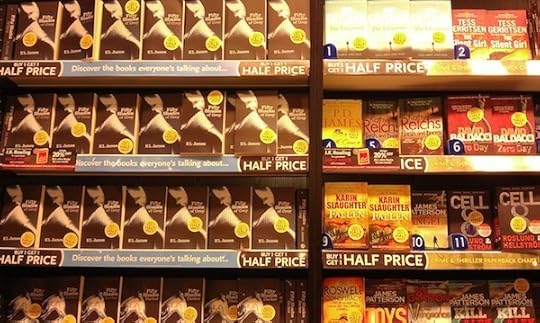
A bookshop, once a place for intellectual and spiritual food…
Finally, what is consumerism/ entertainment culture? It’s actually down to our instinctive behaviour. This culture enables us to satisfy our physiological needs (food and sex), we can experience basic emotions common in animals (fear, wonder, etc.) maybe even some not so common to animals like laughter (caused by perception of humour) – this we also do to be happy, not in order to understand things or to explore our nature.
So, the pop culture serves our basic needs and instincts, while the art that acts on the cerebral level is becoming more niche and even academic. As a result, in my opinion, we are closer to the animal state like never before.
It’s true that we do some things no animals would ever do, they can’t: we destruct our planet, because we have tools. This is actually not our unique quality. A bunch of bacteria would propagate in a flask with a culture medium until all the nutrients are gone and the mass extinction starts. Our destructive behavior is very much natural. Or is it?
What do we do now? I suggest at least to accept that in our society different ways of life philosophies can co-exist peacefully.
Go to zoo, look at all those cute creatures – eating, playing, sleeping, out for a walk.
Being an animal isn’t such a bad thing after all.
November 9, 2013
Turning to Listen. Russian Soul
 Обращение в слух by Антон Понизовский
Обращение в слух by Антон Понизовский
My rating: 4 of 5 stars
Обращение в слух, which can be translated as Turning into a Listening Ear, is an important work marking the return of the so-called ‘novel of ideas’. The book won the biggest Russian literary prize this year – The Big Book.
As a fiction story and plot-wise it’s not very interesting, as a document of human suffering it’s not very original, but it has an important dialogue in it about what it is to be Russian, and it turns out that outside the world of culture, literature, being Russian isn’t very different from being someone of another nation. National identity and mentality are linked to culture and language, this is what defines them.
The most interesting thing about Russian mentality we find in the middle of the book, in the terrific discussions on Dostoevsky. This is a must read for any Dostoevsky’s fan.
The main character Fyodor (a hint on Dostoevsky again), who is Russian by ethnicity, has always lived outside Russia, yet his deep interest in spirituality and Russian literature and identity makes him a lot more Russian than his intellectual yet cynical and materialist opponent – the Belyavsky couple.
I hope this great book is translated into many languages, since it feels like a bridge connecting modern Russian thinking with the country’s literary tradition.
P.S. For some reason Fyodor reminded me of Alyosha Karamazov, the Belyavsky(s) – Mephistopheles.
November 5, 2013
Ender’s Game. Survival vs Genocide
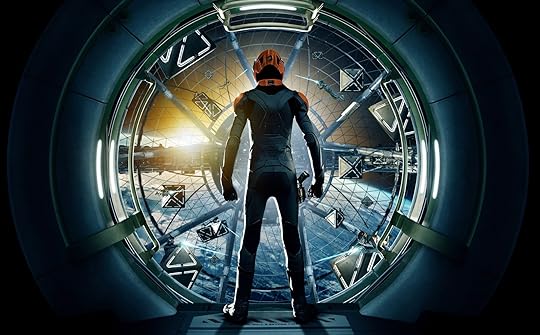
What victory to one is extinction to another.
Ender’s Game is a film adaptation of the first book in Orson Scott Card’s famous YA sci-fi series. It’s the story of a young boy called Ender Wiggin becoming a commander of the spaceship fleet built to rid the Universe of the race of insectoid creatures called Buggers (coincidence or not, Card is known for his homophobic views).
Imagine you are a bright teenager, extremely talented in tactics and strategy. Is this sufficient for you to become a leader? Ender should be humane and fair to deserve respect of his subordinates and, at the same time, ruthless enough to make necessary sacrifice in the battle in order to eradicate the aliens. Is it possible to find such a balance?
Ender’s team goes through some exhausting training in a sophisticated computer simulated environment to get ready to fight the insectoids. Meanwhile, Ender is tortured by a dream where questions of his subconsciousness start getting answered: Who is his enemy? Is it as deadly and evil-natured as he’s been told?
Ender’s Game is a view from the 1980s on biological inter-species competition. Is it moral to kill off another species if it is intelligent, or is it a genocide? Same question is raised by many when we talk about dolphin slaughter in Japan. But dolphins don’t threaten us? How about sharks?
Is our perception of morality and humane treatment, therefore, a slave of the survival instinct? When threatened the mankind turns back to the savage state, – savage doesn’t think, savage acts, because thinking can cost you life.
In the final story twist, Ender attempts to find a compromise when he faces the moral dilemma of xenocide. We can find out about the consequences from the sequel book/film.
October 30, 2013
My Blog. Letting Go
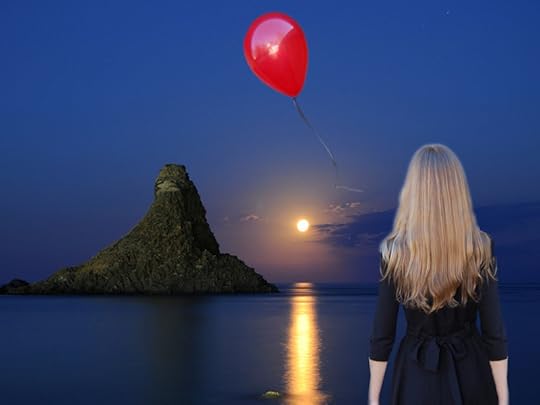
Letting Go (by gnuckx [CC-BY-2.0 (http://creativecommons.org/licenses/b...)], via Wikimedia Commons)
I hardly ever go back to the past, My eyes look into the future. As I move through life, things stick to me like shells and other sea animals to an old barge. So, from time to time I need to let them go.I left home when I was sixteen to travel thousand miles to Moscow where I started at the university. Six years later I emigrated to England, where I finished my studies and became a scientist.
I never really understood how hard it was for my parents and friends to let me go, I only knew what I felt like – born again in a different place, with memories of my previous life fading away fast. I was forgetting who I used to be.
Seems like life has its chapters. And once you finished one of them it’s archived, and you rarely find time to flip through it again: occassional meetings with old friends, looking at old photographs.
In the past two years I’ve been writing this blog, learning about self-discipline, working on my writing, exploring things as ever. Now as change entered my life again on many levels, it’s time to let go of my blog, to break the regularity of it and to write only by impulse, sometimes. I want to focus on my stories more.
It’s a paradox that change is often daunting yet it’s what I need – to move forward, to transform. I wrote a song about it once. Here it is – CHANGE.
October 28, 2013
Film of the Week: Enough Said. Learning Acceptance

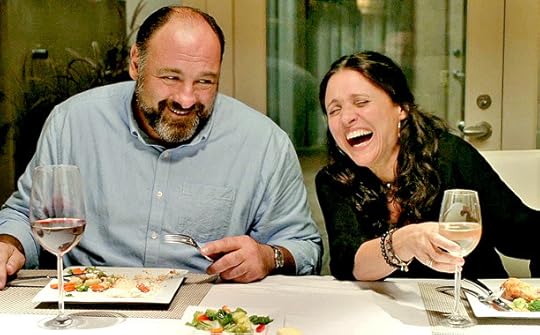
Building a new relationship can be hard, it can even be harder to do it after the first marriage. Enough Said is a new Hollywood drama offering its take on this matter.
Two divorcees meet and like each other. What could go wrong? I guess often there’s this problem – the fear of the second failing relationship.
Eva is a fit 40-plus divorced woman with an adult daughter and she works as a masseuse. One day she comes to the party and there she meets Albert, a middle aged balding and bearded guy with a considerable belly. The two strike up a relationship, though when first introduced at the party they told each other didn’t fancy anyone there. Eva tells to her friend that Albert is not your typical handsome man, yet there’s something about Albert that attracted her. I guess that was their matching personalities.
Then the crack happens. Eva is influenced by a friend’s opinion and starts seeing small negative qualities of Albert. She criticizes him increasingly. In a plot twist, which I won’t reveal to avoid spoilers, tension spikes and damages their relationship. Would Eva be wise enough to understand that nobody is perfect, would she be able to see her own not so gracious behavior?
We often forget that everyone is different and we cannot just change others to suit our liking. If we want to be accepted by people, we need to learn how to accept others first. For Eva it was a lesson to learn.
In my opinion, if she didn’t like Albert’s certain qualities that much, she shouldn’t have messed with his heart at all. Luckily for her, Albert knows much more about acceptance and … forgiveness.
I think the moral of the story is that often by giving someone a chance, you also give it to yourself. And in love matters it’s important to follow your heart and not to rely on somebody else’s opinion too much, because nobody knows you better than you do.
October 25, 2013
A Quick Guide to Cancer: Can We Eradicate It?
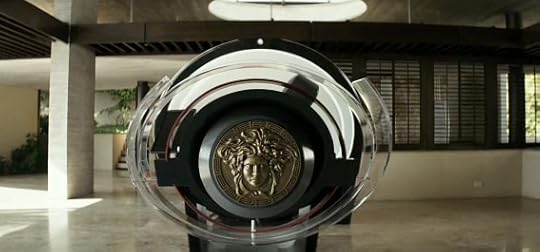
A chamber that cures diseases including cancer featured in the sci-fi film Elysium (credit – Columbia Pictures, 2013)
In the recent scifi Elysium there are wonder-chambers that scan the human body and remove all the cancer cells and diseases and thus keep a person immortal. Is it possible to create such a machine?
I’m often asked about cancer, what the current drugs are, when we will cure it, though I’m not a clinical oncologist but a molecular biologist. Many people don’t understand that cancer is a term for many different types of malignant tumours. Sure they’ve heard of melanoma, carcinoma, blood cancer (for instance, lymphoma). Yet, for some reason, despite the awareness of the different tissues these tumours occur in, there’s often an assumption there is one underlying cause to cancer, which can be found and eliminated for good.
To clarify, I’ll first explain what cancer is. Every cell in our body that is able to divide into more cells does it in a controllable manner. Imagine if cells in our body divided at their whim – would we have our highly structured organs, blood vessels, brain, face or just a chaotic mess of cells?
The body develops from a zygote, a fertilised egg, and from the start of our life embryonic cells divide and migrate in a highly controlled manner. Our cells have complex molecular systems in place in order to be instructed when to divide, when to stop, and when to die. This control is the basis of life, at least for a multi-cellular organism.
So when mutations in our genes happen that affect these molecular systems this can make our cells divide limitlessly. From a single mutated cell like this, a tumour can develop, give metastases, and when the tumour growth interferes too much with physiological processes the body gets sick and eventually dies.
Many cells are mutated in our body every day, but our body eradicates the vast majority of them using the immune system. Immune cells are capable of recognising misbehaving cells and killing them. But that poses a different problem. By eliminating relatively weak tumour cells, our body selects for the most aggressive malignancies that can easily evade our immune system and, horror horror, are more resilient to chemotherapy or other medical intervention.

Oncogene and formation of cancerous cell (by Asw029 (Own work) [CC-BY-3.0 (http://creativecommons.org/licenses/b...)], via Wikimedia Commons)
Now why is there no one common way of treating cancer? That’s because cancer can arise from many cells types and it be caused by different mutations. There are hundreds of genes that when mutated can contribute to tumorigenesis either by being inactivated (tumour suppressor genes like p53) or by becoming hyperactive or overabundant or both (oncogenes like Ras). Then again these mutations can happen in skin cells or liver cells or stem cells in certain tissues. (There’s even a popular theory that all tumours come from stem cells that are mostly differentiated and thus disguised as common somatic tissue cells). So depending on their tissue origin and the identity of mutations tumours differ in their biology, the way they grow, react to the immune system, have their metabolism and as a consequence – respond to therapy.

That’s why, it is therefore currently impossible to create one drug for all of them, an individual approach is needed.
Just half a century ago only about 30% of all tumours were medically curable, now it’s 70-80%. The underlying scoence and the clinical tools are constantly evolving and who knows maybe one day we will come up with the machine like the one in Elysium.
What is stopping us to create it now?
To cure cancer we need to know more about its biology. Most of the biomedical research focused on behaviour of one or several genes and their relationship per study, it is a very reductionist approach. And it’s difficult enough to do even that already. Currently biomedical research moves into systems biology. A modern study attempts to monitor behaviour of thousands of genes/proteins in a given process, cell or tissue. The goal is to to understand how our body works at the whole system level.
Imagine monitoring tumour growth and looking at work of not just one or two genes or cell types but at the whole picture? We are still short of research techniques that would enable us to follow processes with such high resolution and capacity in a living organism. But theoretically it’s possible, so the science will keep making progress.
Aside from treating cancer, bolder question arise – is it possible to keep our body in shape endlessly, to withstand mutations, to keep it structured and healthy indefinitely? Is it possible to overwrite our ageing program in order to stay young?
Should we stay forever young or ageing is a blessing in disguise? Such questions are not simply biological anymore, so maybe we shouldn’t seek just a biological answer. And perhaps, everyone should decide for themselves. What’s your answer?
Further read:
Stem cells and Cloning
Immortality
October 23, 2013
The Fifth Estate vs Mediastan: Assange, Wikileaks, Freedom, Cinema
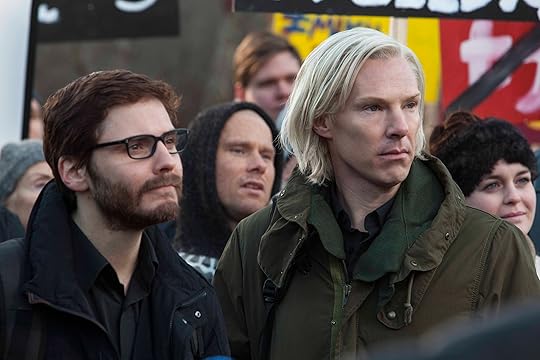
D. Bruhl as Daniel Berg and B. Camberbatch as Julian Assange in the Fifth Estate motion picture
What is freedom?
Is this an ability to act according to one’s wishes without fear of being punished? Can you call something freedom when it takes freedom from the others?
Wikileaks, a group of hackers/ journalists headed by an ex-mathematician Julian Assange, recently became a formidable media power fighting for people’s freedom and against injustice around the world. Wikileaks’ work is based on collecting information from whistle-blowers about some foul activities of governments and corporations and publishing it online on their website or providing this information to major media players, such as Guardian.
No wonder big players in the world of politics and economics don’t like Assange. He’s been accused of committing rape and is still being prosecuted, but these charges very possibly were pressed against him for political reasons. Julian Assange has now been sheltered in the Ecuador embassy in London and he wasn’t being idle there.
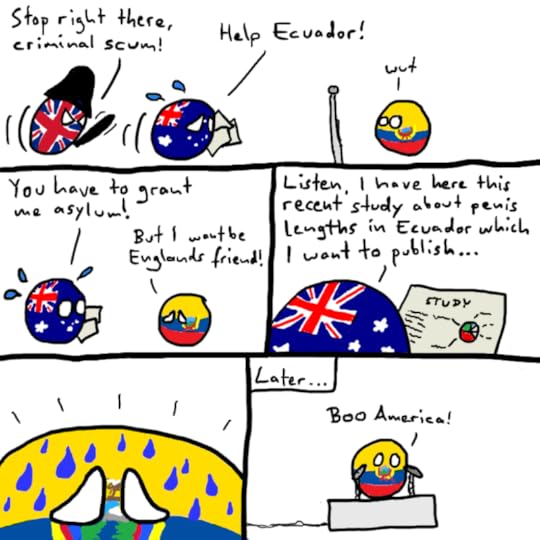
A humorous take on why Ecuador granted Assange political assylum (picture by Bernd [CC0 or CC0], via Wikimedia Commons)
Time have passed to evaluate first impacts of the Wikileaks activity. The wikileaked materials on corruption in the Tunisian government were likely the major trigger of Arab spring. The turmoil in that region continues and we have yet to see the real consequences. The most currently discussed Wikileaks’ ‘bomb’ is publishing thousands of Pentagon diplomatic cables provided by the private Bradley Manning, now Chelsea Manning, who was just sentenced to 35 years term in prison. And this is the point where Hollywood steps in.http://www.youtube.com/watch?v=ZT1wb8_tcYU
The Fifth Estate is Bill Condon’s political thriller starring Benedict Camberbatch as Assange and Daniel Brühl as Daniel Berg, a man who once was Assange’s sidekick in Wikileaks.
The film is based on Berg’s recollections of his time in Wikileaks and it is a story of Berg’s disillusionment with Assange.
Camberbatch creates a memorable character, a smart rebel and a bit of a sociopath who is keen to expose wrongdoings of the world’s most powerful people and organisations. Camberbatch’s Assange is an egomaniac, but I don’t know how true that is in relation to the real Assange. When two people go different ways, their grudges can hardly be objective in mutual judgements. This is the reason why I took the whole story as purely fictional and enjoyed it much more this way.
Camberbatch with his magnetic performance shows once again why he’s currently a number one male actor in the world. The German actor Daniel Brühl, who has just starred in Howard’s Rush, is on the rise too. It was pleasure to see Alicia Vikander (of Sweden) as Berg’s girlfriend. There wasn’t much to play here for her as in Anna Karenina, where she was Kitty, but nevertheless she’s gathering the momentum. Hollywood needs fresh talent from all over the world.
I wasn’t surprised when I read than Assange called this film a ‘snoozefest’ that has nothing common with reality whatsoever. He wasn’t portrayed in the film exactly in a flattering light. But I think the truth is somewhere int he middle. Anyway, if you are keen to explore what was real and what wasn’t, Wikileaks made it easy for you – they’ve made a list of inaccuracies and ’blatant lies’ in The Fifth Estate. Enjoy.
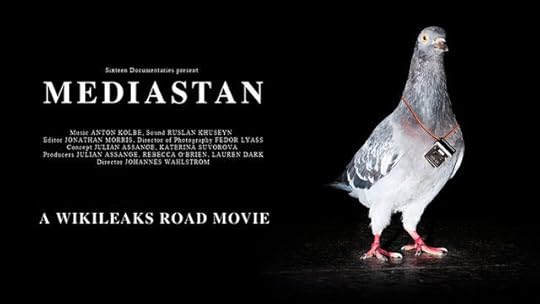
Click to go to Wikileaks page about Mediastan
Wikileaks punched the last nail into The Fifth Estate’s box office coffin by releasing their own film, a documentary called Mediastan that focuses on ex-Soviet Middle Asia and the state of media there. Half of the film if not two thirds are narrated and interviewed in Russian, since it’s the most commonly used language in this region. The crew is headed by a young Swedish filmmaker and journalist Johannes Wahlström, there are three Russians in the crew as well.
Factually this documentary has nothing in it I haven’t heard before. Many newspapers in this region are funded by the US, so they often couldn’t publish Wikileaks cables fearing the termination of their funding. In the ironic twist, the remainder of the film features interviews with editors of Guardian and New York Times that dealt with the infamous cables. These western newspapers couldn’t publish everything they wanted fearing law suits they couldn’t financially afford.
So in the end, Mediastan shows that the press is not free anywhere it under financial pressure one way or another. Even Wikileaks itself is under the same pressure, they need to crowd-fund their activity, at least with Mediastan they could do it by charging for streaming/downloads.
I think there was a confusion in the media regarding The Fifth Estate and Mediastan: the two films were juxtaposed as first being fake Hollywood moneymakers and Mediastan as a truthful response to it. In reality, they are complementing each other, in my opinion.
A lot of people don’t have time to follow intricacies of the international politics but they like watching films. Both films are subjective views on the world of media. The Fifth Estate is a semi-fictional story based on real events. It’s an engaging thriller, but it’s not a archive document, so it’d be silly to expect it to be accurate and truthful.
Mediastan builds a story to make its point about oppressed media, it’s far more authentic but less entertaining. Any moderately educated individual living in the post-Soviet space knows infinitely more about the corruption and the state of media in this region than it was shown in the film. If Wikileaks intend to make a real splash they could collaborate with Alexei Navalny and produce Putinistan next time. I guarantee an explosion in the box office for such project. N.B. This could be dangerous.
Vladimir Lenin, one of world’s greatest minds, once said,
“… of all the arts, for us the cinema is the most important.“
Freedom fighters, take a note. People don’t enjoy reading blogs as much as they love watching films and pirating them, especially in the post-Soviet continent.
You may ask me what I think about Wikileaks, their activity and the films. I like being an observer, not a judge. I welcome anyone who brings information to the world. Of course, knowledge should be treated responsibly and Wikileaks’ way of spreading knowledge will continue being debated for a long time.
We’ll see what happens next, but now enjoy the films.
October 21, 2013
Modern Russian Authors: Tatiana Tolstaya. Slynx and the Russian language

Tatiana Tolstaya (photo credit – Водник, Wikimedia Commons)
Tatiana Tolstaya is one of the most prominent media figures in the modern Russian society, she’s also a publicist and a writer of short stories and novellas, some of which could be found in English. Her TV program The School of Aspersion, which she co-hosts with a film director Audothia Smirnova, is based on interviews with famous artists, scientists, culture and media workers, and enjoys wide popularity amongst the ’intelligentsia‘.
She is a grand-daughter of the great Soviet author Alexei Nikolaevich Tolstoy, famous for his Peter I epic novel and the scifi novel Aelita (not to confuse with Lev Tolstoy who wrote War and Peace).
Tatiana Tolstaya is a top notch language master and stylist. Her writing is exquisite – if language was edible and tasty people would devour her books endlessly. Tolstaya’s only novel to date, Slynx, has received several literary awards. It’s a postapocalyptic dystopia exploring the relationship between the individual and the society. An important aspect of the book is focused on knowledge and education and their major enemy – political power.
The story is set in the future Russia, after the nuclear strike, all life and people are mutated, the culture is mostly lost, yet a man called Benedict is aching for knowledge. He’s afraid of Slynx, a imagianry creature that howles somewhere far away. Slynx is perhaps a metaphor of the darkness of human soul, of the irrational fear of the unknown. I believe this novel is an instant classic and will be studied in schools in no time if it’s not already a part of the curriculum.
Aside from her literary awesomeness, Tatiana Tolstaya is known for being an ardent advocate for proper use of the Russian language, both writing and speaking, she a self anointed No.1 Russian ‘Grammar Nazi’. Only jocking. I dread to think what could’ve happened if I wrote this post in Russian (with as much slip ups as I make in English) and she read it. Boo!
Several years ago Tolstaya published a chapter of her new book, Archangel, in the Russian magazine, Snob. I really hope that Tatiana won’t be having forever busy TV schedule and the new novel will see the light of the day eventually.
I’d like to finish with a quote that belongs to this gifted, wise woman,
”Art has nothing to do with politics. It is the freest thing in the world.”


